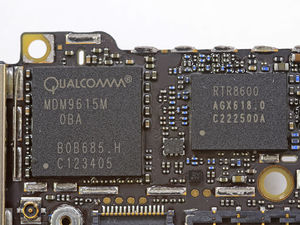|
The iPhone Wiki is no longer updated. Visit this article on The Apple Wiki for current information. |
Difference between revisions of "MDM9615"
m (→iPhone 5c, iPhone 5s, iPad Air and iPad mini 2G) |
|||
| Line 38: | Line 38: | ||
[[5.02.00]] 7.0.3 (Build 11B511) |
[[5.02.00]] 7.0.3 (Build 11B511) |
||
=== [[iPhone 5c]], [[iPhone 5s]], [[iPad Air]] and [[iPad mini 2G]] === |
=== [[iPhone 5c]], [[iPhone 5s]], [[iPad Air]] and [[iPad mini 2G]] === |
||
| − | The first [[iPad Air]] |
+ | The first [[iPad Air]]s and [[iPad mini 2G]]s were delivered with iOS 7.0.3, so the oldest possible baseband would be [[1.02.02]] for these devices. |
[[1.00.06]] 7.0 (Build 11A466) |
[[1.00.06]] 7.0 (Build 11A466) |
||
7.0.1 (Build 11A470a) |
7.0.1 (Build 11A470a) |
||
Revision as of 17:50, 5 November 2013
The Qualcomm MDM9615M is the baseband chip used in the iPhone 5. It is a 28 nm LTE (FDD and TDD), HSPA+, EV-DO Rev B, TD-SCMA modem and allows for multi-spectrums, multi-mode LTE support. It is responsible for transmitting simultaneous voice and data transfer on LTE (provided the carrier has the infrastructure to allow simultaneous voice and data transfer.)
Right next to the Qualcomm MDM9615M is the Qualcomm RTR8600 multi-band/mode RF transceiver. The RTR8600 is paired alongside the MDM9615 to support various bands, including 5 UMTS bands, and over 5 LTE and 4 EDGE bands.
Contents
Baseband Firmware
The firmware for the baseband chip comes in either Mav5-X.XX.XX.Release.bbfw files (for the iPhone 5, iPad 4 and iPad mini 1G) or Mav7Mav8-X.XX.XX.Release.bbfw files (for iPhone 5c, iPhone 5s, iPad Air and iPad mini 2G), with X being the version digits. The BBFW file is just a renamed standard ZIP archive and contains a couple of .mbn files which are all digitally signed with a certificate from Qualcomm - similar to the iPhone 4S.
One notable difference to the iPhone 4S baseband, is that since the iPad 3 and iPhone 5, the main baseband code is entirely running on the Hexagon DSP.
Looking at strings found in the baseband, this is based on the same source code base as used on older qualcomm chipsets by other manufacturers (like HTC).
Known Firmware Versions
iPhone 5, iPad 4 and iPad mini 1G
1.00.16 6.0 (Build 10A405) 1.01.00 6.0.1 (Build 10A525) 6.0.2 (Build 10A551) 3.04.01 6.1b (Build 10B5095f) 3.04.06 6.1b2 (Build 10B5105c) 3.04.12 6.1b3 (Build 10B5117b) 3.04.17 6.1b4 (Build 10B5126b) 3.04.25 6.1b5 (Build 10B143?) 6.1 (Build 10B143) 6.1.1b (Build 10B311) 6.1.2 (Build 10B146) 6.1.3b2 (Build 10B318) 6.1.3 (Build 10B329) 6.1.4 (Build 10B350) 4.14.01 7.0b (Build 11A4372q) 4.17.01 7.0b2 (Build 11A4400f) 4.18.02 7.0b3 (Build 11A4414e) 4.18.06 7.0b4 (Build 11A4435d) 5.00.00 7.0b5 (Build 11A4449a) 7.0b6 (Build 11A4449d) 5.00.01 7.0GM (Build 11A465) 7.0 (Build 11A465) 7.0.2 (Build 11A501) 5.02.00 7.0.3 (Build 11B511)
iPhone 5c, iPhone 5s, iPad Air and iPad mini 2G
The first iPad Airs and iPad mini 2Gs were delivered with iOS 7.0.3, so the oldest possible baseband would be 1.02.02 for these devices.
1.00.06 7.0 (Build 11A466) 7.0.1 (Build 11A470a) 7.0.2 (Build 11A501) 1.02.02 7.0.3 (Build 11B511)
| This firmware article is a "stub", an incomplete page. Please add more content to this article and remove this tag. |
